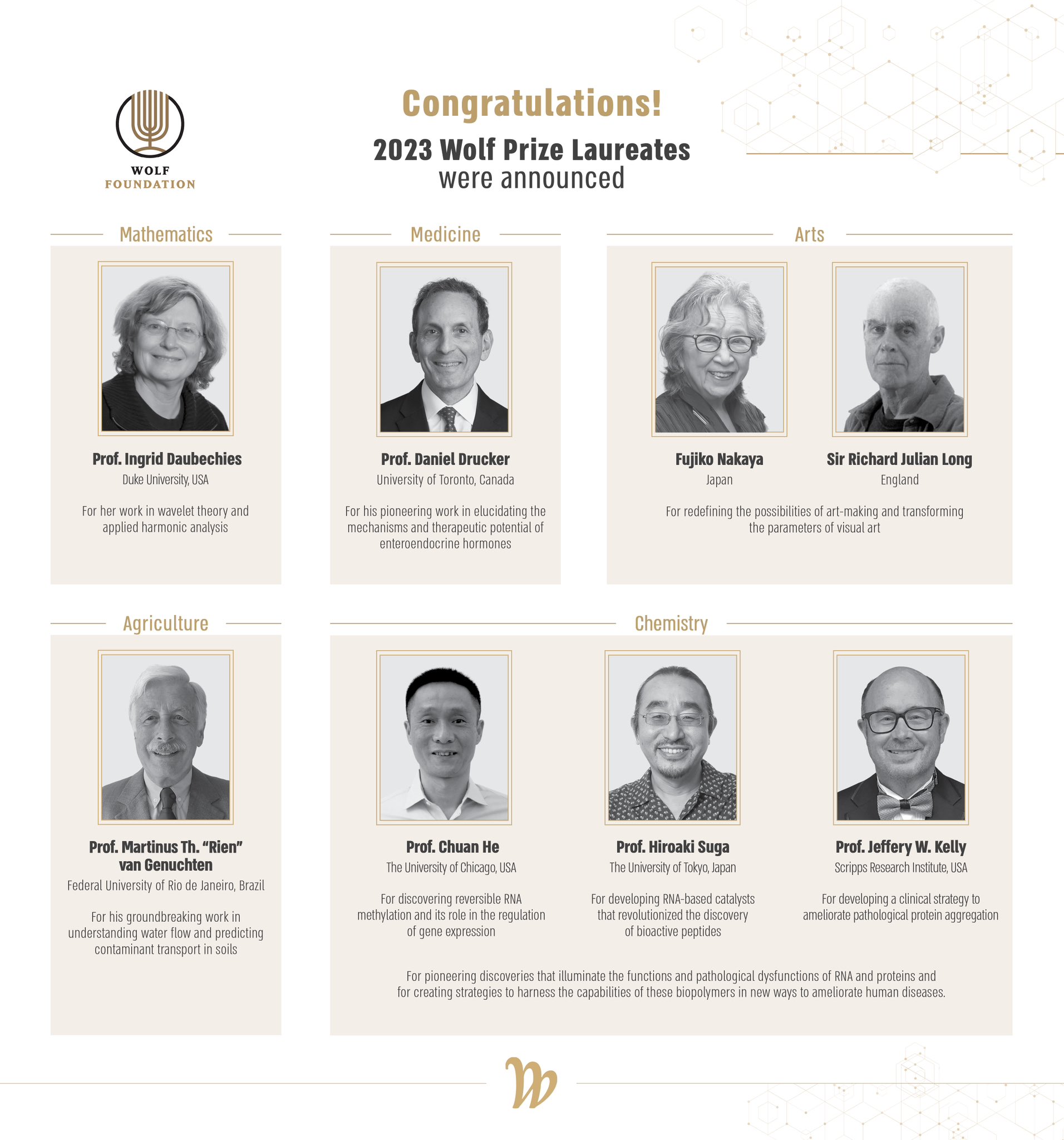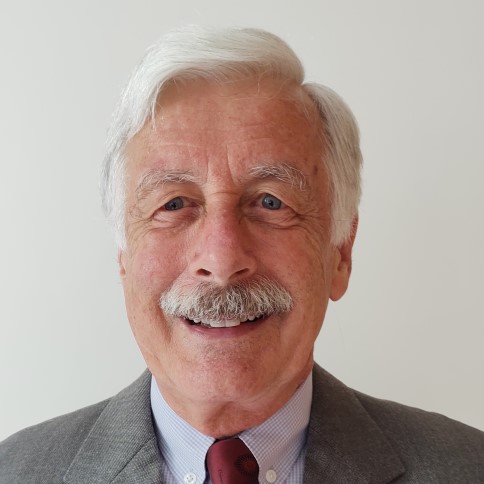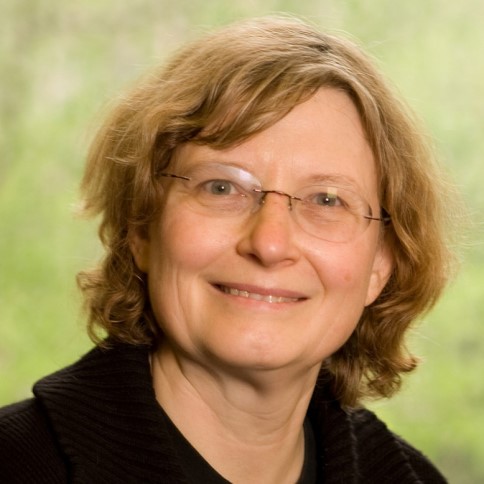
On February 7, 2023, local time in Israel, the Wolf Prize, known as the "Nobel Prize vane", was announced again.
6 scientists from the United States, Canada, Japan, and Brazil and 2 artists from the United Kingdom and Japan will receive the 2023 Wolf Prize.
The award is presented annually. About a third of Wolf Prize winners have subsequently been awarded Nobel Prizes.
Among them, He Chuan, a Chinese-American chemical biologist, professor at the University of Chicago, and alumnus of the University of Science and Technology of China, won the 2023 Wolf Prize in Chemistry for his pioneering work on the chemistry and function of RNA modification.
The other two scientists who will receive the 2023 Wolf Prize in Chemistry are Professor Jeffery W. Kelly of the Scripps Research Institute in the United States and Professor Hiroaki Suga of the University of Tokyo in Japan.
The Wolf Prize is of a lifetime achievement nature. The Wolf Prize has been awarded annually by the Israel Wolf Foundation since 1978. The science categories of the award include medicine, agriculture, mathematics, chemistry and physics, and the art categories of the award include painting and sculpture, music and architecture. Awards in each field include certificates and $100,000 cash prizes. Its award ceremony will be held in Jerusalem.
So far, 375 scientists and artists around the world have won the Wolf Prize.

6 scientists from the United States, Canada, Japan, and Brazil and 2 artists from the United Kingdom and Japan will receive the 2023 Wolf Prize. The pictures in this article are from the official website of the Wolf Foundation and its twitter
2023 Wolf Prize list
According to the official website of the Wolf Foundation, the 2023 Wolf Prize in Medicine is awarded to Daniel Drucker, a professor at the University of Toronto, Canada, in recognition of his pioneering work in elucidating the mechanism of action and therapeutic potential of intestinal endocrine hormones .
The 2023 Wolf Prize in Agriculture is awarded to Martinus Th. "Rien" van Genuchten, professor at the Federal University of Rio de Janeiro, Brazil, for his work in understanding water flow and predicting the impact of pollutants in soil Pioneering work on migration in .
The 2023 Wolf Prize in Chemistry was jointly awarded to He Chuan, a professor at the University of Chicago, Jeffery W. Kelly, a scientist at the Scripps Research Institute in the United States, and Hiroaki Suga, a professor at the University of Tokyo in Japan. For their pioneering discoveries that elucidated RNA and protein function and pathological dysfunction and created strategies to harness these biopolymers in novel ways to ameliorate human disease.
The award was awarded to Professor He Chuan for his discovery of reversible RNA methylation modification and its role in gene expression regulation.
The award was awarded to Prof. Hiroaki Suga for his development of RNA-based catalysts that revolutionized the development of bioactive peptides.
The award is presented to Professor Jeffrey W. Kelly for his development of clinical strategies to ameliorate pathological protein aggregation.
The 2023 Wolf Prize in Mathematics is awarded to Ingrid Daubechies of Duke University, USA, for her work on wavelet theory and applied harmonic analysis (Applied Harmonic Analysis). She is also the first female president of the International Union of Mathematicians.
The 2023 Wolf Art Prize has been jointly awarded to Japanese artist Fujiko Nakaya and British sculptor Sir Richard Julian Long for redefining artistic creation possibilities and changed the parameters of the visual arts.
2023 Wolf Prize Winners for Medicine

Daniel Drucker, a professor at the University of Toronto in Canada, studies a range of hormones produced in the pancreas, gastrointestinal tract and brain. These hormones control the secretion of blood sugar and insulin, and also regulate our appetite.
Daniel Drucker is a Canadian endocrinologist and professor of medicine at the University of Toronto, a senior scientist at the Lunenfeld-Tanenbaum Institute at Mount Sinai Hospital in Toronto, Canada, and a member of the Royal Society. Professor Drucker is known for his research on gut hormones and their application in the treatment of diabetes and other metabolic diseases. Because boosting the action of gut hormones may be beneficial in the treatment of diabetes, obesity and inflammatory bowel disease, related hormone analogs could become new treatments for diseases that afflict millions of people around the world.
Drucker was born and raised in Montreal, Quebec, Canada, and studied at the University of Ottawa. He graduated from the Faculty of Medicine at the University of Toronto (1980) and worked at the Johns Hopkins Hospital (1980-1981), the University of Toronto (1980-1984) and Massachusetts General Hospital, Harvard Medical School (1984-87) Undergraduate training (medicine and endocrinology).
Professor Drucker's laboratory is recognized worldwide for its research and focus on translating scientific breakthroughs into clinical treatments. The laboratory has made significant contributions to the development of new treatments for type 2 diabetes and new treatments for short bowel syndrome. His research has great potential for treating obesity.
Professor Drucker studies a range of hormones produced in the pancreas, gastrointestinal tract and brain. These hormones control the secretion of blood sugar and insulin, and also regulate our appetite.
Professor Drucker was awarded the Wolf Prize for his pioneering contributions to our understanding of the physiology and pharmacology of glucagon-like peptides (GLPs) and their use for the benefit of patients. His discoveries of GLP-1, GLP-2 and dipeptidyl peptidase 4 (DPP-4) activity have enabled the development of multiple innovative classes of drugs to treat diabetes, obesity and obesity-related comorbidities. He demonstrated that glucagon-like peptide-1 (GLP-1) directly stimulates insulin secretion from pancreatic beta cells.
Over the past 35 years, Drucker has led research in this field, elucidating the importance of GLP-1 action for controlling pancreatic islet β-cell proliferation and survival, regulating endoplasmic reticulum (ER) stress, and β-cell plasticity. Drucker is widely recognized for his ongoing contributions to the diverse and novel roles of GLP-1 in the brain, gut, endocrine and exocrine pancreas, immune system, and heart and blood vessels. He also described the fundamental mechanism between DPP-4 activity and metabolic control. His pioneering research validated DPP-4 as a drug target and described the importance of DPP-4 for the control of the gut-island axis.
2023 Wolf Prize Winners in Agriculture

Due to its attractive mathematical properties and simplicity, the van Genuchten equation is now commonly used in numerical simulators of subsurface flow and transport processes.
According to information on the official website of the Wolf Foundation , Martinus Th. “Rien” van Genuchten, a professor at the Federal University of Rio de Janeiro in Brazil, was born in Viech, Brabant Province, southern Netherlands. Vught received his early education at Wageningen Agricultural University and received his Ph.D. at New Mexico State University. Van Gnuchin's career has been exemplary and far-reaching, with numerous collaborations around the globe. He has also served as co-editor and associate editor of nine journals and founded the academic journal of near-surface environmental science, the Vadose Zone Journal.
A karst zone (vadose zone) is an unsaturated portion of the subsurface above the water table in which the soil and rock are not completely saturated with water. That is, its pores contain air. The movement of water within karst areas is important for agriculture, pollutant transport, and flood control. It is crucial in determining the quantity and quality of groundwater available for human consumption.
During his 40-year career, Professor Van Gnuchin transformed the broad fields of soil physics and aquifer hydrology. These fields are at the heart of modern agricultural operations and climate science. He created a much-needed scientific foundation for understanding fluid flow and pollutant transport processes in unsaturated soils, including their interactions with the atmosphere and groundwater. Contemporary aquifer hydrology would not be imagined without his many contributions. These contributions established connections between agriculture, soil science, geology, environmental science and civil engineering. Of particular importance is his research on the fundamental processes of water and chemical transport in soil systems. His work on non-equilibrium transport of agricultural chemicals remains a milestone.
He pioneered the dual-porosity and dual-permeability models, considered moving and immobile liquid regions in unsaturated porous media, derived new analytical and numerical solutions, and performed some of the most authoritative laboratory and field experiments to test these models. His models have profoundly improved the prediction of complex in situ phenomena and have prompted numerous studies along similar lines to address water and chemical transport in natural soils and rocks. Due to its attractive mathematical properties and simplicity, the van Genuchten equation is now commonly used in numerical simulators of subsurface flow and transport processes.
Professor van Gnuchin was awarded the Wolf Prize for reshaping the disciplines of soil physics and aquifer hydrology, as well as for his numerous contributions to agriculture, soil science and hydrology. Not only did he publish hundreds of papers in scientific journals, he also wrote user manuals for many of his computer programs. These programs are now used all over the world.
2023 Wolf Prize Winners in Chemistry

Professor He Chuan discovered the reversible RNA methylation modification, thus making a conceptual breakthrough in the regulation of gene expression by RNA modification.
According to the Alumni Association of the University of Science and Technology of China, He Chuan is a Chinese-American chemical biologist, a John T. Wilson Distinguished Service Professor at the University of Chicago, and a researcher at the Howard Hughes Medical Institute. He graduated from the University of Science and Technology of China in 1994, received a Ph.D. Long (2012-2017).
According to the official website of the Wolf Foundation, Professor He Chuan is a world-class expert in the study of RNA post-transcriptional modifications and their role in the process of cell life, as well as their extensive impact on mammalian development and human diseases. His research spans the broad fields of chemical biology, nucleic acid chemistry, biology, epigenetics, and bioinorganic chemistry. Their findings explain how RNA methylation works by characterizing reader proteins. This process plays a key role in many types of cancer, including endometrial cancer, acute myeloid leukemia and glioblastoma. His work is fundamental to the development of potential therapeutics targeting RNA methylation effectors to treat human diseases such as cancer.
More than 150 structurally distinct post-transcriptional chemical modifications occur at thousands of sites on cellular RNA molecules. Some of these modifications are dynamic and may have critical regulatory functions similar to protein modifications and DNA modifications. Therefore, understanding the extent and mechanisms of dynamic RNA modification is an emerging research frontier in biology and medicine.
Professor He Chuan was the first to support the view that "RNA modification is reversible and can control gene expression". His lab discovered the first RNA demethylase, an enzyme that removes methyl groups from the most prevalent mRNA modification in eukaryotes -- N6-methyladenosine. He discovered the reversible modification of RNA methylation, which led to a conceptual breakthrough in the regulation of gene expression by RNA modification.

The Kelly lab has uncovered fundamental features of protein homeostasis (proteostasis) at the molecular level and, based on these fundamental insights, has developed drugs. This approach may be applicable to other diseases related to protein homeostasis.
Jeffery W. Kelly is the Lita Annenberg Hazen Professor of Chemistry at the Scripps Research Institute. He received his BS in chemistry from the State University of New York at Fredonia, his PhD in organic chemistry from the University of North Carolina at Chapel Hill (1986), and his postdoctoral research in bioorganic chemistry at The Rockefeller University (1989).
All cells contain an extensive protein homeostasis network, including protein folding apparatus such as chaperones and other factors that prevent or regulate protein aggregation. These defense networks tend to decline during the aging process. Most protein molecules must fold into a defined three-dimensional structure in order to be functionally active. However, some proteins can adopt several folded states. Misfolded proteins can form toxic aggregates such as soluble oligomers and fibrillar starch deposits, which may contribute to Alzheimer's disease and many other neurodegenerative diseases.
Professor Kelly's research focuses on understanding protein folding, misfolding and aggregation, and using chemical and biological approaches to develop new therapeutic strategies to combat diseases caused by protein misfolding and aggregation. He has made major contributions to the fight against neurodegenerative diseases by discovering the mechanism of protein aggregation in amyloid diseases affecting the heart and nervous system. He showed how transthyretin unfolds, aggregates into clumps, and kills cells, tissues, and ultimately patients. He developed a molecular approach to stabilize the protein.
Kelly successfully developed the first drug to be approved by regulators - tafamidis vyndaqel. The groundbreaking drug is marketed to dramatically slow the progression of a neurodegenerative disease, familial amyloid polyneuropathy, and familial and sporadic TTR cardiomyopathy, a disease that leads to heart failure.
Jeffrey W. Kelly has been awarded the Wolf Prize for developing a novel and clinically impactful strategy to ameliorate human disease caused by pathological protein aggregation. His seminal contribution was to reveal fundamental features of protein homeostasis (proteostasis) at the molecular level, including the interplay between protein folding, misfolding, and aggregation. Dysregulation of protein homeostasis is associated with a range of human diseases. Kelly's lab developed the drug based on these fundamental insights. This approach may be applicable to other diseases related to protein homeostasis.

The catalyst invented by Hiroaki Suga goes beyond natural mechanisms and greatly expands the range of amino acids that can bind to ribosomes.
Hiroaki Suga received his BS in Engineering (1986) and MS in Engineering (1989) from Okayama University, Japan, his PhD in Chemistry (1994) from the Massachusetts Institute of Technology, USA, and served as a Postdoctoral fellow. He began his independent career at SUNY Buffalo (1997-2003). In 2003, he transferred to the Advanced Science and Technology Research Center of the University of Tokyo. Since 2010, he is a full-time professor at the Department of Chemistry, University of Tokyo. Currently, he serves as the President of the Chemical Society of Japan.
Prof. Suga's research interests include bioorganic chemistry, chemical biology, and biotechnology related to RNA, translation, and peptides. As a young researcher, he made significant progress in incorporating unnatural amino acids into tRNAs using RNA-based enzymes, or ribozymes. The technology, known as "Flexizyme" (flexible enzymes), greatly expands the potential for reprogramming the genetic code. Through the in vitro translation system, he can add various unnatural amino acids to produce macrocyclic peptide molecules. Professor Hiroaki Suga used oligonucleotide display and directed evolution to create the RaPID system, a platform for the production and selection of billions of macrocyclic peptides as high-affinity binders for target proteins.
In 2006, Professor Hiroaki Suga co-founded PeptiDream to promote and apply the RaPID system. This system quickly became a widely used technique for finding small protein-binding agents, especially small molecules designed to disrupt protein-protein interactions. His discoveries allow complex molecules to be constructed on a large scale, which was not previously possible using only traditional methods. Compared with other methods, Suga's method produced more unique, unnatural molecules with unique stereochemistry, rich functional group density, and three-dimensional structure needed to study the regulation of biological processes. This paves the way for a new generation of drug development. PeptiDream is currently a listed company on the Tokyo Stock Exchange and is one of the most successful startups in Japan.
Professor Hiroaki Suga was awarded the Wolf Prize for his development of an exceptionally innovative in vitro screening system for cyclic peptides for screening inhibitors of protein-protein interactions. He invented an RNA-based catalyst called flexizyme. This catalyst goes beyond natural mechanisms and greatly expands the range of amino acids that can bind to ribosomes. Suga's strategy enables rapid construction and screening of huge cyclic peptide libraries. His unique discoveries established a new approach to medicinal chemistry and resulted in new drug discovery tools.
2023 Wolf Prize Winners in Mathematics

Ingrid Daubechies' work has brought sophisticated image processing to fields ranging from art to evolutionary biology.
Ingrid Daubechies is a Belgian mathematician and physicist currently at Duke University in Durham, North Carolina, USA. She received her BA in Physics in 1975 from the Free University of Brussels, Belgium. She then continued her research at the same university, earning a Ph.D. in Physics.
Ingrid Dobesy's love for math and science was cultivated from an early age. Her father fostered her curiosity and interest in these subjects while she was in school. As a child, she was fascinated by how things are built, how they work, the mechanisms behind machinery, the truth behind mathematical concepts. When she can't sleep, she'll even crunch big numbers in her head, thinking it's appealing that numbers will grow rapidly.
Professor Ingrid Dobesi has made significant contributions to the field of wavelet theory. Her research has revolutionized the way images and signals are processed digitally, providing standard and flexible algorithms for data compression. This has led to widespread innovation in technologies including medical imaging, wireless communications, and even digital cinema.
Wavelet theory, developed by the work of Professor Dobesi, has become an important tool in many areas of signal and image processing. For example, it has been used to enhance and reconstruct early Hubble images, to detect forged documents and fingerprints. Furthermore, wavelets are an important component of wireless communication and are used to compress sound sequences into MP3 files.
In addition to her scientific contributions, Professor Dobesi advocates for equal opportunity in science and mathematics education, especially in developing countries. As president of the International Mathematical Union , she worked hard to advance the cause. She is aware of the barriers women face in these fields and works to mentor young women scientists and increase their representation and opportunities.
Ingrid Dobesy was awarded the Wolf Prize for her work in creating and developing wavelet theory and modern time-frequency analysis. Her discovery of smooth, compactly supported wavelets and her development of biorthogonal wavelets transformed image and signal processing and filtering.
Her work has enormous importance for image compression, medical imaging, remote sensing, and digital photography. Dobesi also made unparalleled contributions in developing practical applications of harmonic analysis, thereby introducing sophisticated image processing techniques to fields ranging from art to evolutionary biology.
Dobesy's most important contribution was her 1988 proposal of smooth compact-supported orthogonal wavelet bases. These bases have revolutionized signal processing, providing efficient methods for digitizing, storing, compressing, and analyzing data such as audio and video signals, computed tomography, and magnetic resonance imaging. The compact support of these wavelets makes it possible to digitize signals in time that is linearly dependent on the signal length. This is a key factor for signal processing researchers and engineers, who can rapidly decompose a signal into a superposition of contributions at different scales.
In addition, her development of biorthogonal wavelets has become the basis for the JPEG 2000 image compression and coding system.


